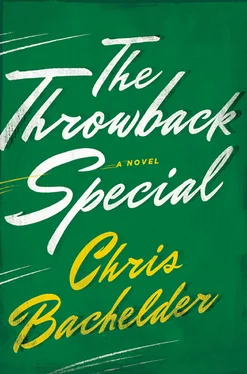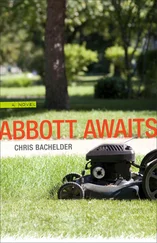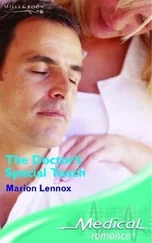THERE WAS A DEER next to the dumpster behind the hotel. It stood still in the rain, ears alert, waiting to be frightened. A grainy version of the deer occupied a small box in the third column of the fourth row of the surveillance grid of the sixteen-channel CCTV monitor at the front desk. Like anyone shown on a surveillance monitor, the deer appeared to be involved in a crime.
In another box of the surveillance grid, the parking lot glittered blackly.
In another box, four grown men threw a football in a hallway.
In another box, two employees from the AquaDoctor scrubbed the lobby fountain with soft brushes.
In another box of the surveillance grid, the stairwell was so profoundly deserted as to seem post-human.
In another box, an elevator passenger dropped into a three-point stance.
In another box, it was very difficult to tell what exactly was going on.
In another box, a man wearing an elbow pad ran an unsustainable pace on the treadmill in the workout center.
In another box, two grown men threw a Frisbee in a hallway.
In another box, the continental breakfast had long since ended.
In another box, was that a cat in a hallway?
In another box, inhabitants of the conference center applauded silently.
In another box of the surveillance monitor, the front desk clerk ignored the sixteen-channel surveillance monitor.
In another box, a man pacing and gesticulating alone in a hallway was either suffering from mental illness or using a phone with a hands-free headset.
In another box, an upside-down bird gnawed grainily on the knotted rope in its cage.
In the final box, an elderly man walked with purpose and a dignified limp through the lobby doors, into the hotel, vanishing from the box. He then reappeared in the front desk box, placing his elbows on the desk in a manner that seemed both inquisitive and assertive. He spoke with the front desk clerk — he appeared to speak with the front desk clerk — then walked briskly out of the box. The elderly man reappeared in the elevator box, pressing buttons, or more likely pressing a single button repeatedly. Here, in the elevator, you could see him well. He was perhaps seventy-five, with a full head of neatly trimmed gray hair. He was tall, with excellent posture. He wore a plaid shirt tucked into dark pants, but it was not difficult to imagine him wearing a uniform of some sort. The man did not, like almost all passengers, look at himself in the mirror on the back wall of the elevator. After a time, the elevator doors opened, and he exited the box. He reappeared in a different box of the sixteen-box surveillance grid, walking toward a group of grainy men throwing a football in a hallway. Most of the men dispersed immediately, though one of the men stood against the wall as if frozen. His face, which was not clearly visible on the surveillance monitor, had a startled expression. The abandoned football still spun on the hallway carpet like the altimeter dial of a rapidly descending aircraft. Midway down the hall, the elderly man stopped outside of a room, and knocked on the door. The vending alcove was neither visible nor audible. The man appeared to say something to the door. One is forced to assume that he was viewed through the peephole. Eventually, the door opened, and the elderly man entered the room, disappearing from the box in the fourth column of the second row of the surveillance grid. By this time the deer, too, was gone from the box with the deer in it.
IN THE LOBBY, Wesley walked circles around the fountain, where a quality control representative on break from the Prestige Vista Solutions retreat was talking to the workers from the AquaDoctor about ornamental carp. Wesley’s daughter was having trouble sleeping because someone at school had told her that Jesus got pinned to the arch for his belief system, but right now Wesley needed to concentrate on Giants nose tackle Jim Burt. What Wesley needed to keep in mind, according to Steven, was that Burt was undrafted out of the University of Miami. As Burt, Wesley had the not-insignificant role of pushing hard up the middle, then diving belatedly onto a screaming pile containing Theismann. The key was to wait for Gary Reasons, played by Bald Michael, to dive late onto Theismann, whose leg was already fractured by Taylor, before he commenced his own late dive onto Theismann’s fractured leg. There were two late hits — Reasons had the early late hit, and Burt had the late late hit. Burt had invented the Gatorade shower, Steven said. The rhythmic whisper of the soft brushes against the tiles of the fountain sounded like a mother putting her baby to sleep. Wesley, at any rate, had to remain patient. He had to have an internal clock, Steven said. He had to make certain he did not get too excited and dive prematurely late, as certain Burts had in previous years. (Gary’s Burt, four or five years ago, arrived at Theismann almost before Taylor.) Wesley’s uniform had pizza sauce on the shoulder stripes. “Do you mean nailed to the cross?” Wesley had said to his daughter, immediately regretting it. He had chosen to care about accuracy, correctness. Why? The child had seemed fragile ever since the squirrels had mutilated her jack-o’-lantern. “Hey, look, it just makes it spookier,” Wesley had said, holding up the mauled pumpkin, but the child was inconsolable. Her worry box was full. “This is not something that just started,” Wesley’s wife had said. “She’s always been like this.” “She’s just overly sensitive,” Wesley said. “That’s exactly what I’m talking about,” his wife had said. Wesley missed his children, the gay son in college, the troubled girl at home. He wanted them not to suffer, even though he knew suffering was important. He wanted them not to have more than their fair share. He was helping to raise sensitive children. That was the worst kind of children, the most painful. “He came back to life, though, honey,” Wesley had said of Jesus, immediately regretting it. It was the early afternoon, Saturday, but as he walked around the fountain Wesley imagined his daughter sleeping. That was the time he loved her best. That was the only time she wasn’t running her mouth. That was the only time she wasn’t explaining the world, trying to make it safe with her words. The workers from the AquaDoctor and the quality control representative from Prestige Vista Solutions looked up to see the elderly man walking through the lobby, lightly gripping the arm of a nondescript Caucasian male, perhaps forty-five, with brown hair (streaked gray), receding hairline, pale and puffy and carelessly shaven face, rogue hair growth in ears and nostrils, bushy eyebrows, yellowed teeth, vitamin deficiency, wrinkles around eyes, some dark spots on face and hands, maybe six-feet-two in college but now shorter, about one ninety or one ninety-five with an incipient gut, a slight limp, no visible scars or tattoos, a slightly enlarged prostate, wearing ill-fitting jeans, a pilly sweater from Target, and a light jacket with a dry sheen. The two men were clearly father and son — you could see it in their walk — but the elderly man had aged far better than the younger man. The father’s grip on the son’s arm was less about support than custody. The younger man carried a duffel bag.
The front desk clerk looked down from the father and son to watch the father and son grainily traverse a small box on the sixteen-channel surveillance monitor. “We could carve the other side of the pumpkin,” Wesley had said to his daughter. “We could get another pumpkin,” he had said. “We could go eat the squirrels’ food,” he had said, pretending to dig up nuts with his paws. “Honey,” he had said to his daughter, “those Bible stories were translated.” Wesley, circling the fountain, preparing intently for his role as nose tackle Jim Burt, did not see Adam’s father leading Adam out of the hotel.
Читать дальше












